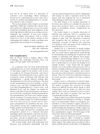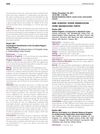 6 citations,
April 2019 in “Endocrinology and Metabolism Clinics of North America”
6 citations,
April 2019 in “Endocrinology and Metabolism Clinics of North America” Testosterone therapy for transmasculine individuals is generally safe with medical supervision, improves mental health, and has mixed effects on physical health.
 May 2019 in “Cytotherapy”
May 2019 in “Cytotherapy” Patients in Australia underwent costly, unproven stem cell treatments due to weak regulations and aggressive marketing.
[object Object]  162 citations,
August 2002 in “Survey of Ophthalmology”
162 citations,
August 2002 in “Survey of Ophthalmology” Latanoprost can make eyelashes longer, thicker, and darker.
 32 citations,
January 2018 in “American Journal of Clinical Dermatology”
32 citations,
January 2018 in “American Journal of Clinical Dermatology” Hormone therapy affects hair growth in transgender individuals, with testosterone potentially causing hair loss in trans men and estrogen reducing facial/body hair in trans women; treatment options vary.
 1 citations,
January 2018
1 citations,
January 2018 Improve burn patients' appearance and function using various techniques, teamwork, and psychological support.
 19 citations,
August 2000 in “International Journal of Dermatology”
19 citations,
August 2000 in “International Journal of Dermatology” Minoxidil and finasteride can slow or halt hair loss, but may have side effects.
 3 citations,
July 1997 in “Current problems in dermatology”
3 citations,
July 1997 in “Current problems in dermatology” Hair restoration surgery has evolved over time, with a focus on natural-looking results and managing patient expectations, while also considering potential complications and the lifelong progression of male pattern baldness.
 38 citations,
February 2012 in “Aesthetic Surgery Journal”
38 citations,
February 2012 in “Aesthetic Surgery Journal” Facial rejuvenation surgery has evolved to yield natural results with low complication rates, and more men and older patients are choosing this surgery.
 43 citations,
September 2012 in “International Journal of Dermatology”
43 citations,
September 2012 in “International Journal of Dermatology” Hormonal therapies are safe and effective for treating adult women's acne.
 December 2011 in “Journal of The American Academy of Dermatology”
December 2011 in “Journal of The American Academy of Dermatology” The book is a detailed and useful guide for doctors learning about hair transplantation.

The data suggests that dosing differences can help manage spasticity in patients with upper motor neuron dysfunction.
 August 2018 in “Journal of the American Academy of Dermatology”
August 2018 in “Journal of the American Academy of Dermatology” Patients often experience long-lasting changes to their hair after stem cell transplants.
 18 citations,
August 2019 in “Journal of Cosmetic Dermatology”
18 citations,
August 2019 in “Journal of Cosmetic Dermatology” PRP therapy may increase hair density in pattern hair loss without serious side effects, but more research is needed.
 March 2021 in “PARIPEX INDIAN JOURNAL OF RESEARCH”
March 2021 in “PARIPEX INDIAN JOURNAL OF RESEARCH” Microneedling combined with platelet-rich plasma therapy is more effective for hair regrowth in androgenic alopecia than microneedling alone, but it's more painful.
 9 citations,
March 2005 in “Aesthetic surgery journal”
9 citations,
March 2005 in “Aesthetic surgery journal” The long-pulse alexandrite laser effectively removes hair permanently.
 9 citations,
September 2016 in “Medical Clinics of North America”
9 citations,
September 2016 in “Medical Clinics of North America” Eating less and exercising more, with personalized diet plans and realistic goals, can lead to weight loss and better health, but more research is needed for long-term success.
 May 2012 in “The journal of nervous and mental disease”
May 2012 in “The journal of nervous and mental disease” The book provides comprehensive information on Impulse Control Disorders but lacks definitive evidence for effective treatments.
 November 2023 in “Journal of cosmetic dermatology”
November 2023 in “Journal of cosmetic dermatology” Fat transplants using a patient's own fat can rejuvenate and repair tissues effectively.
 August 2024 in “Journal of Cosmetic Dermatology”
August 2024 in “Journal of Cosmetic Dermatology” Injectable treatments can effectively and safely improve hair growth in adults with androgenetic alopecia.
 11 citations,
January 2019 in “Sexual Medicine”
11 citations,
January 2019 in “Sexual Medicine” Younger transgender women have surgery earlier, are mostly attracted to men, and show more preoperative depression that improves after surgery compared to older transgender women.
March 2023 in “Journal of Cosmetic Dermatology” Hair transplantation significantly improves quality of life and self-esteem in men with hair loss.
 December 2016 in “Springer eBooks”
December 2016 in “Springer eBooks” A 45-year-old woman with autoimmune diseases experienced patchy hair loss due to alopecia areata, which has no cure but can be treated, with varying success.
[object Object]  May 2015 in “Hair transplant forum international”
May 2015 in “Hair transplant forum international” The article concludes that PRP might help with hair loss, but more detailed research is necessary.
 January 2012 in “Elsevier eBooks”
January 2012 in “Elsevier eBooks” Hair transplantation is highly effective with careful technique and attention to patient needs.
 June 2023 in “Journal of Cosmetic Dermatology”
June 2023 in “Journal of Cosmetic Dermatology” AI and AR are improving cosmetic dermatology but face challenges like data quality and ethical concerns.
 2 citations,
January 2015 in “Journal of cosmetology & trichology”
2 citations,
January 2015 in “Journal of cosmetology & trichology” Need better hair loss treatments beyond minoxidil, finasteride, and transplants.
 378 citations,
November 2011 in “Human reproduction update”
378 citations,
November 2011 in “Human reproduction update” Experts recommend using evidence-based methods to diagnose and treat hirsutism, focusing on symptoms and underlying causes.
 24 citations,
July 2019 in “Reproductive Medicine and Biology”
24 citations,
July 2019 in “Reproductive Medicine and Biology” The review suggests new ways to classify ejaculation problems and recommends different treatments based on the type of issue.
 100 citations,
April 2010 in “Expert Opinion on Pharmacotherapy”
100 citations,
April 2010 in “Expert Opinion on Pharmacotherapy” Hair loss in men treated best with early medication or transplant, new treatments researched.
 12 citations,
February 2007 in “Facial Plastic Surgery”
12 citations,
February 2007 in “Facial Plastic Surgery” Hair transplantation techniques have improved over 12 years, with follicular unit grafting providing more natural results and potential future advances in automation and genetics.




























